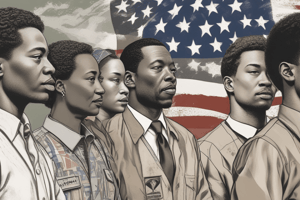Podcast
Questions and Answers
Which court case ruled that racial segregation in public schools was unconstitutional in the United States?
Which court case ruled that racial segregation in public schools was unconstitutional in the United States?
- Plessy v. Ferguson
- Dred Scott v. Sandford
- Brown v. Board of Education (correct)
- Korematsu v. United States
Which piece of legislation prohibited discrimination on the basis of sex in the United Kingdom?
Which piece of legislation prohibited discrimination on the basis of sex in the United Kingdom?
- Human Rights Act
- Gender Recognition Act
- Sex Discrimination Act of 1975 (correct)
- Equality Act
Which of these individuals was not a key figure in the U.S. Civil Rights Movement?
Which of these individuals was not a key figure in the U.S. Civil Rights Movement?
- Malcolm X
- Rosa Parks
- Martin Luther King Jr.
- Mahatma Gandhi (correct)
Which of the following individuals advocated for civil rights and equality in South Africa?
Which of the following individuals advocated for civil rights and equality in South Africa?
Which of these individuals advocated for civil rights and equality in Pakistan?
Which of these individuals advocated for civil rights and equality in Pakistan?
Which of the following best describes the evolution of civil rights over time?
Which of the following best describes the evolution of civil rights over time?
What do civil rights refer to?
What do civil rights refer to?
Which historical event is associated with civil rights advancements in the United States?
Which historical event is associated with civil rights advancements in the United States?
What significant legislation was passed in the U.S. during the Civil Rights movement?
What significant legislation was passed in the U.S. during the Civil Rights movement?
In contemporary discussions, which movement focuses on combating police violence and systemic racism?
In contemporary discussions, which movement focuses on combating police violence and systemic racism?
Which is NOT an aspect commonly discussed in contemporary civil rights discourse?
Which is NOT an aspect commonly discussed in contemporary civil rights discourse?
During which time period did African Americans struggle against Jim Crow laws in the U.S.?
During which time period did African Americans struggle against Jim Crow laws in the U.S.?
Flashcards are hidden until you start studying
Study Notes
Civil Rights refers to individual freedoms from government control granted by law. These rights may include equality before the law, freedom of religion, freedom of speech, freedom of assembly, the right to bear arms and freedom from discrimination. The concept has evolved significantly over time, with many civil rights movements advocating for changes in laws and social norms to expand these liberties.
Historical Overview
Historically, civil rights have been associated with societal advancements such as suffrage, desegregation, and equal representation within various institutions. In the United States, the term is often linked with African Americans' struggle against Jim Crow laws in the late 1800s and early 1900s. This period saw significant progress towards racial equality, including the passage of landmark legislation like the Civil Rights Act of 1964 and the Voting Rights Act of 1965. However, it also marked the beginning of the War on Poverty and a new focus on addressing economic inequality.
Contemporary Developments
In contemporary discourse, discussions around civil rights often center around issues relating to gender equality, LGBTQ+ rights, disability rights, and immigrant rights. Prominent among these is the Black Lives Matter movement, which emerged in response to police violence and systemic racism, demanding accountability and justice for victims while working towards larger reforms to combat social inequality.
Cases and Court Decisions
Civil rights have been the subject of numerous court decisions and cases that have shaped the legal landscape in various countries. For instance, the United States Supreme Court, in its landmark decision in Brown v. Board of Education, ruled that racial segregation in public schools was unconstitutional. Similarly, in the United Kingdom, the Sex Discrimination Act of 1975 prohibited discrimination on the basis of sex, ensuring equality in various areas of life.
Key Figures
Numerous individuals have played significant roles in championing civil rights. In the United States, figures like Martin Luther King Jr., Malcolm X, and Rosa Parks are known for their contributions to the Civil Rights Movement. Globally, figures such as Nelson Mandela in South Africa, Mahatma Gandhi in India, and Malala Yousafzai in Pakistan have advocated for civil rights and equality.
Conclusion
In conclusion, civil rights encompass a range of individual freedoms that have evolved over time to include broader societal advancements. From historical struggles for suffrage and desegregation to contemporary issues relating to gender, race, and immigration, civil rights continue to play a vital role in shaping societies and promoting equality.
Studying That Suits You
Use AI to generate personalized quizzes and flashcards to suit your learning preferences.




